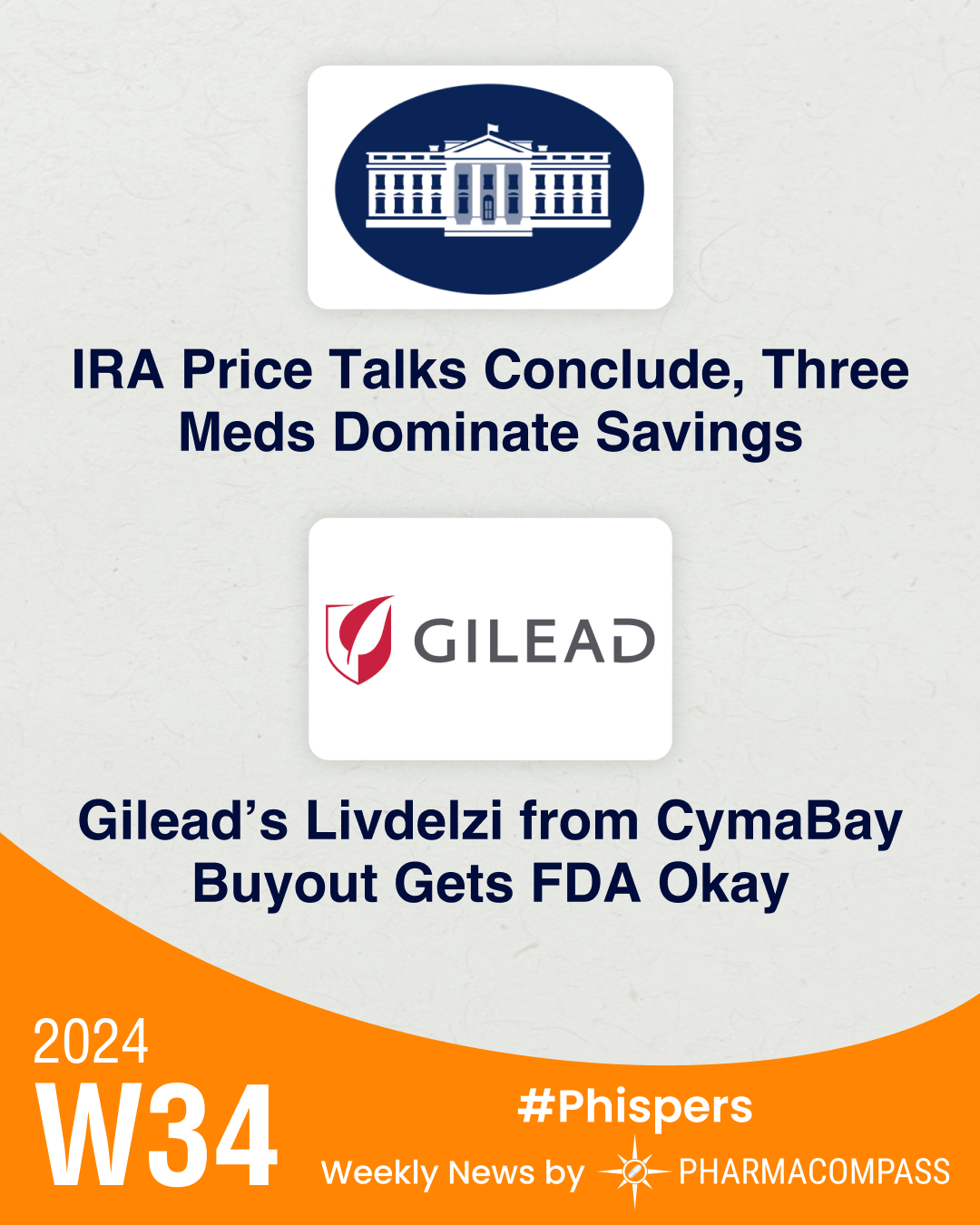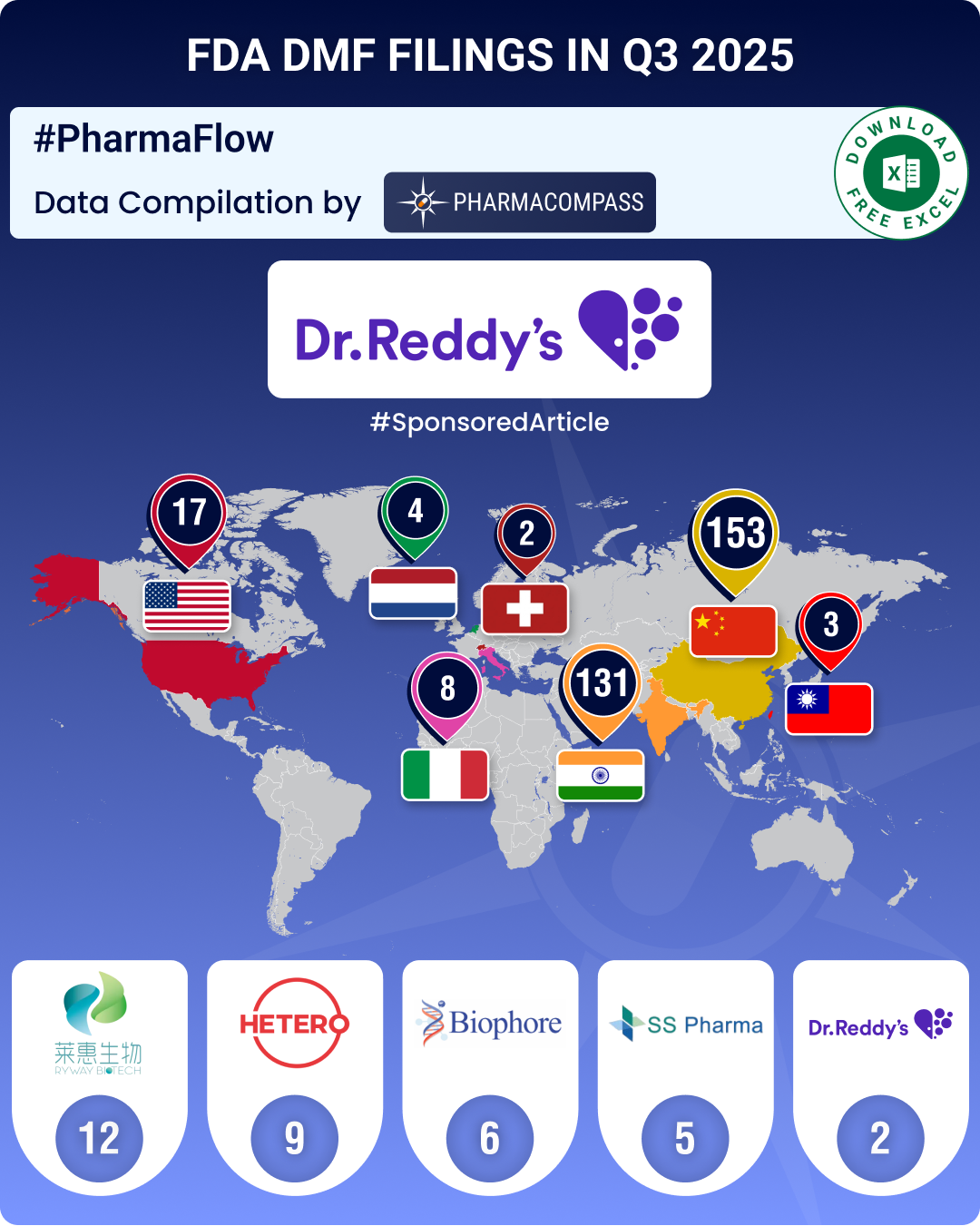
By PharmaCompass
2024-08-22
Impressions: 989 Article || 12 Video
This week, the Biden-Harris Administration said it has concluded price negotiations for 10 drugs under the Inflation Reduction Act (IRA), with new prices set to take effect in 2026. This is expected to generate substantial savings for Medicare, with just three drugs – Stelara (ustekinumab), Enbrel (etanercept), and Eliquis (apixaban) – accounting for over half of the projected US$ 6 billion savings.
Eli Lilly's tirzepatide has shown it can drastically reduce the onset of type 2 diabetes in pre-diabetic adults in a study. The US Food and Drug Administration (FDA) has approved Gilead's Livdelzi for patients with primary biliary cholangitis. The drug was the lead candidate in Gilead’s US$ 4.3 billion CymaBay buyout. Johnson & Johnson’s Rybrevant combination therapy has become the first chemotherapy-free treatment in the US for non-small cell lung cancer, potentially challenging AstraZeneca’s Tagrisso.
Africa is in the throes of an mpox outbreak and Emergent BioSolutions is donating 50,000 doses of its smallpox vaccine to affected African countries.
In the realm of collaborations, Denmark’s Adcendo has signed a US$ 1 billion licensing deal for an antibody-drug-conjugate (ADC) candidate. Meanwhile, Regeneron faced a setback for its blood cancer therapy due to manufacturing issues, and Aurobindo’s Eugia unit received an FDA warning letter.
IRA price talks conclude; Stelara, Enbrel, Eliquis to bring 51.4% of Medicare savings
On August 15, the Biden-Harris Administration announced it has reached agreements for new, lower prices for all 10 drugs selected for negotiations under the IRA. The new prices come into effect from January 1, 2026. Had the new prices come into effect last year, the US government’s Medicare health insurance program would have saved US$ 6 billion across the 10 drugs, or approximately 22 percent of what was spent. Meanwhile, a Brookings Institution report said that just three drugs will account for over half of the expected US$ 6 billion savings in 2026. J&J’s Stelara (US$ 1.4 billion), Amgen’s Enbrel (US$ 1.1 billion), and BMS’ Eliquis (US$ 856 million) are expected to account for US$ 3.28 billion or 51.4 percent of Medicare savings.
Zepbound, Mounjaro cut risk of diabetes in overweight, pre-diabetic adults by 94%
Lilly said tirzepatide (Zepbound and Mounjaro) slashed the risk of developing type 2 diabetes in overweight or obese adults with pre-diabetes by 94 percent. One in three adults in the US, or around 98 million Americans, have pre-diabetes. The data comes from the drug’s longest trial. Over the three-year period, weight loss was sustained in pre-diabetic adults on the 15 mg dose.
FDA okays Gilead’s liver disease drug acquired via US$ 4.3 bn CymaBay buyout
FDA has granted accelerated approval to Gilead’s Livdelzi (seladelpar), which was the lead candidate of its US$ 4.3 billion buyout of CymaBay Therapeutics. The once-daily pill was greenlit in the US for primary biliary cholangitis (PBC), an inflammatory liver disease. Livdelzi is positioned to challenge the current PBC standard of care, which falls short for many people who experience inadequate response to the treatment, putting them at risk for continued liver damage, the California-based drugmaker said.
J&J’s Rybrevant okayed for NSCLC: J&J’s high hopes for Rybrevant (amivantamab-vmjw) got some validation when the FDA approved it for use in combination with its new drug Lazcluze (lazertini) to treat a kind of non-small cell lung cancer (NSCLC). It was okayed as a first line of treatment for NSCLC patients with a mutated form of a gene known as EGFR. The combination is the first and only chemotherapy-free regimen to show superior progression-free survival versus AstraZeneca’s Tagrisso (osimertinib) – the standard of care in the first-line setting.
Astra’s other blockbuster cancer drug Imfinzi (durvalumab) was approved by the FDA to treat adult patients with a kind of NSCLC as an additional treatment after surgery. Imfinzi is already approved to treat a late-stage form of the disease, where surgery on the cancer is difficult.
Denmark’s Adcendo inks ADC pact with Multitude worth US$ 1 bn
Adcendo said it has gained global licensing rights to Multitude Therapeutics’ first-in-class ADC candidate outside of the Greater China region for up to US$ 1 billion. The ADC’s clinically validated target, tissue factor (TF, also known as coagulation factor), is highly expressed in indications such as NSCLC, colorectal cancer, cervical cancer, esophageal cancer, head and neck cancer, bladder cancer and certain gastrointestinal cancers. However, its expression is limited in normal tissues. ADCE-T02 is a highly differentiated anti-TF ADC, and the first such therapy to enter clinical development in Australia, the US and Europe.
Incyte’s blood cancer drug Monjuvi sees late-stage trial win
Incyte said its drug Monjuvi (tafasitamab) has met its primary goal in a late-stage trial in patients with a type of blood cancer. Monjuvi in combination with BMS’ Revlimid (lenalidomide) and Biogen’s Rituxan (rituximab) achieved progression-free survival in patients with relapsed or refractory follicular lymphoma, when compared to Rituxan and Revlimid alone.
FDA rejects Regeneron’s blood cancer therapy over manufacturing issues
Regeneron said it was issued a complete response letter after FDA declined to approve its therapy, linvoseltamab, in patients with multiple myeloma whose cancer had worsened or returned after at least three prior lines of treatment. The decision was not a surprise to the company, and it said the sole reason was related to findings from a pre-approval inspection at a third-party fill/finish manufacturer. The manufacturer has since informed Regeneron that it believes the findings have been resolved and that their facility is awaiting re-inspection by FDA.
Aurobindo’s Eugia unit hit with FDA warning letter: FDA has shot off a warning letter to Aurobindo’s Eugia unit in Hyderabad (India). The firm failed to ensure that laboratory records included complete data derived from all tests. It also failed to prepare batch production and control records with complete information and establish and follow appropriate written procedures that are designed to prevent microbiological contamination.
Emergent to donate 50K smallpox vaccine doses to fight mpox outbreak in Africa
Emergent BioSolutions said it is working with the WHO and the US government and will donate 50,000 doses of its smallpox vaccine to the Democratic Republic of the Congo and other impacted countries of Burundi, Kenya, Rwanda and Uganda to address the mpox outbreak. Last week, WHO had declared a global emergency as a new variant of mpox, known as clade Ib, had spread rapidly in Africa. Emergent’s vaccine has shown to be effective against mpox in an animal study.
The PharmaCompass Newsletter – Sign Up, Stay Ahead
Feedback, help us to improve. Click here
Image Credit : Phisper Infographic by PharmaCompass license under CC BY 2.0
“ The article is based on the information available in public and which the author believes to be true. The author is not disseminating any information, which the author believes or knows, is confidential or in conflict with the privacy of any person. The views expressed or information supplied through this article is mere opinion and observation of the author. The author does not intend to defame, insult or, cause loss or damage to anyone, in any manner, through this article.”








